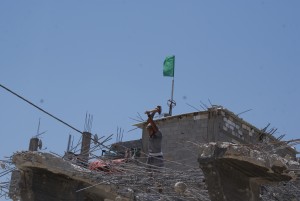Womb service and labour saving devices
By Khaled Diab
Could pregnancy outside the womb save women the pain of labour and herald in a new level of gender equality?
13 August 2009
There is something mysterious, mystifying, magical and also menacing about pregnancy. The swelling belly, rising like a bun in the oven. The wall of tissue separating mother and father from child. The foetus's tentative attempts to communicate pleasure, dissatisfaction, and hold conversations through the primitive Morse code of kicks and jabs.
For the expectant mother in particular, pregnancy carries a huge emotional cache. The foetus growing inside her is both a part of her and apart from her which enables the mother to bond in a way that a father can only dream of. The umbilical cord connecting them relays not only nourishment but also moods and emotions.
I witness this in my wife whose bond with our baby grows stronger every day: her regular communion with him, the unconscious way she holds her tummy, the subtle nuances conveyed by the way he shifts inside, and the meaning of the different pokes. Of course, I also have a connection with him – albeit a less direct one. I talk to him and see the surface evidence of his development, his faint taps through Katleen's skin, the rare grainy glimpse of him during our visits to the gynaecologist.
In addition, he and the cat seem, after an initial period of distrust on the part of the cat, to have built something of a relationship: he pokes more when Kuku comes to lie on Katleen's belly and even seems to hum when the cat purrs.
What sense does the baby have of the outside world from inside his cocoon? I know he can hear and feel and I wonder what he makes of his mama, papa and cat. I imagine what it must be like inside the womb – I know we have all been there but how many of us can remember? Is it as cosy and comfortable as we adults like to assume? Or would the little one, curled up in the proverbial foetal position, prefer more legroom and a womb with a view?
When it's time to leave, will he miss the security of his confinement and the 24-hour womb service? Or will he let out a scream of delight as he dives head first towards the everyday light at the end of the tunnel and the official start of his life?
Understandably, Katleen does not yet want to think about the actual delivery (D-Day) – and I can't blame her. It fills me with awe, bewilderment and panic – and my role is only a supporting one! Despite the undoubted pleasure and significance of bringing a life into this world, the process does involve an awful lot of pain.
Is it desirable for medical science to find a way to spare women the suffering of labour – create a new kind of labour-saving device? Perhaps some boffins will go beyond the initial spark in a petri dish at the core of IVF treatment and develop a complete incubation system – an artificial womb – that would host the unborn child for the entire nine months of the pregnancy, and the parents would pay regular visits to the incubator to watch their child develop.
Such a for-now SciFi possibility would enable men and women to play equal roles as prospective parents, and enable women once and for all to take full control of their bodies, and may even be healthier for the foetus as the womb would be perfectly calibrated for it.
The pill and other effective contraceptive devices helped not only to trigger the sexual revolution – transforming sex into a largely risk-free leisure activity – but they also evened the sexual playing field between men and women, helping cement ideas of equality.
Perhaps removing the last major biological distinction between men and women would herald in a new dawn of equality, but if it becomes universal enough, it would raise the profound and fundamental question of why we need men and women – and the battle of the sexes could take on a decidedly nihilistic bent. Alternatively, just as sex has evolved from procreation to recreation, perhaps nostalgia and love of diversity would lead to us holding on to our biological differences for the sheer fun of it.
On the down side, such technology may banish the pain and discrimination associated with pregnancy, but it would also rob women off its joys. Moreover, it may be bad for the child. Millions of years of evolution have made the bond formed between mother and foetus crucial to the psychological health and well-being of the baby; tampering with that could cause massive alienation and erase the loving link between them.
Moreover, is the price of the possible convenience worth paying, considering the physical and psychological deformities it could potentially cause as we feel around blindly in this largely uncharted field? In addition, even if the science one day proves sound, the associated ethical conundrums should give us pause for thought as it could affect society in ways that end up harming men, women and babies. At the end of the day, removing pain from the equation may not actually bring about a gain.


